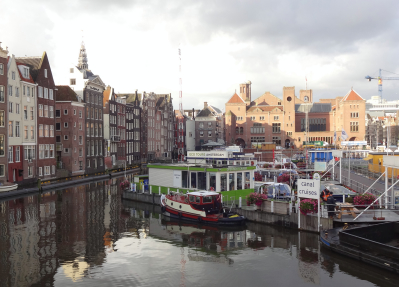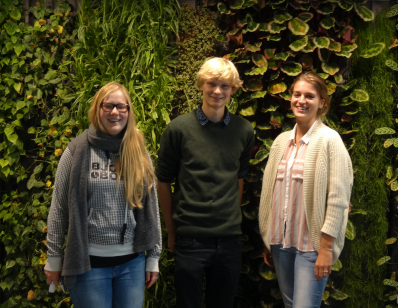
In the previous issue, Ewha Voice reported on the environmental sustainability efforts of the University of Groningen as the first article of a three-part coverage special on Holland. As the second part of the special, this issue of the Ewha Voice will mainly discuss the endeavors on environmental sustainability of one university and one social business:
Leiden University College (LUC) The Hague and rootAbility. Although LUC The Hague and rootAbility differ in their organizational characteristics and operations, they share a common goal and message – helping students take an active part and role in the matters of environmental sustainability.
LUC The Hague encourages students to study and ponder sustainability
An international honors college of Leiden University, Leiden University College (LUC) The Hague selects students from around the world to study pressing global challenges and aspire to make a genuine difference. The school provides the students a broad general education in various academic fields from philosophy to science. After their first year of general learning, students choose their major among key global topics and focus on that particular issue.

“Our vision is to develop an interdisciplinary science program that allows students to enter into competitive graduate
programs with solid training in rigorous fields of science,” said professor Paul Hudson, Director of Studies and Associate Professor of Physical Geography at LUC The Hague. “We want to give our students a sense of breadth of different fields, because that’s what you need to really deal with the big environmental problems today.”
The university also has an objective to train students to think for themselves through active discussions with other students and professors.
“That is our main goal: critical thinking,” explained professor Thijs Bosker, Assistant Professor in Environmental Science at LUC The Hague. “So we give you the knowledge but we expect you to think about this and come up with your own arguments.”
With such vision and purpose, the students at LUC The Hague study in-depth the issues and challenges troubling the world today, one of which is environmental sustainability.
“I think environmental sustainability seems like one of the most fundamental things you know,” remarked Aiken Besley, a student majoring in sustainability at LUC The Hague. “We live on this world so we should make sure it is there for the future.”
The students are motivated to take action and make a difference in the world.
“I was interested in environmental issues and was wondering why nothing happened or as not much happened as necessary,” recalled Robin Vroom, a sustainability major student at LUC The Hague. “Then I realized that I should just go into the field myself and make sure that something happened.”
The sustainability major taught at the university covers various aspects of the topic, such as a very scientific, a political or an economic side. The students choose among the various tracks within their major and focus on particular issues in which they are interested. Their studies and research are reinforced by the methodological courses where they study how to do proper research.
“For me, I am really interested in toxicology, so I am going to take a look at ecotoxicology and how pollutants affect
different systems,” Besley added.
Besides in-class studies, students have the opportunity for field research as well. During the summer of 2014, two students majoring in sustainability, Robin Vroom and Liselotte van Balen, went to the United States to conduct research on the environmental effects of the 2010 BP oil spill.
“What we did may seem very small, but in the bigger picture, the research lab is very important work for the Gulf of Mexico and its ecosystem,” van Balen commented.
Moreover, some students participate in student group activities related to environmental sustainability. The Act Aware
Committee, for example, organizes events that focus on sustainability and other social issues to raise student awareness. Some of the committee’s eco-friendly activities include a clothing swap, a fundraising party
and the creation of a network with a local farmer to supply LUC students with organic local fruits and vegetables.
Overall, the general awareness level regarding environmental sustainability seems to be quite high among students in the Netherlands.
“As soon as I started teaching in the Netherlands, I became very aware there were strong differences,” exclaimed Hudson, who had previously taught in the United States. “The students in the Netherlands are much more aware of different management approaches, different ways of thinking about how to combat environmental change.”
The students studying sustainability, however, think that there is still room for improvement.
“They know the bigger picture; they know ‘climate change,’” Vroom explained. “However, they are not concerned about those little things that are still pretty big in the long term.”
Recognizing the environmental problems existing in the present world, the students at LUC The Hague hope to influence various environment-related sectors in the future, thus contributing to saving the world.

